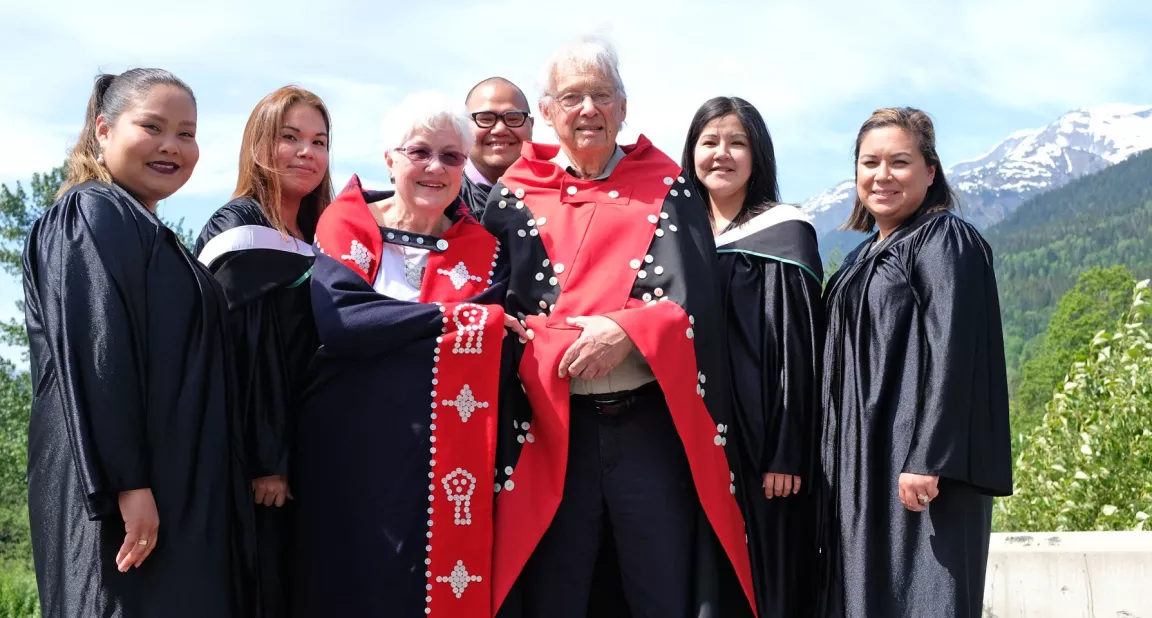Graduates Aim to Encourage Nisga'a Language, Culture

Pauline Stewart and Constance Azak knew when they crossed the stage in Gitwinksihlkw to receive their University of Northern British Columbia degrees that their credential was more than just a personal academic accomplishment, it was the latest step in continuing to chart a revitalized future for the Nisga’a culture.
Both Stewart and Azak completed Bachelor of Arts degrees in First Nations studies and both did so knowing they will be able to play a leadership role in ensuring the next generation will have the opportunity to learn more about Nisga’a history and language.
“Language and culture are very important for me, especially for our young people,” Azak said. “In order to keep the language and culture alive we need to do it ourselves.”
Stewart completed her studies while working full-time with the Laxgalts’ap Village Government. In addition to her BA, she also received her Nisga’a language certificate.
Both of Stewart’s parents are fluent Nisga’a speakers and she said she has started using Nisga’a words on social media as a way to encourage her peers to pick up more of the language.
“It’s really something exciting,” she said of the renewed interest in language in the community. “I look forward to the future of our younger generation.”
Stewart and Azak were among six students to receive credentials after completing their studies at the Wilp Wilxo’owhl Nisga’a Institute in the Nass Valley. Students are able to complete their studies while staying, and in many cases working, in their home communities.
Christina Bolton received two certificates, one in Nisga’a studies and one in Nisga’a language. Damian Azak earned his language certificate, and Marianne Guno and Sammy Azak both received certificates in general First Nations studies.
The graduates marked not only their graduation, but an important milestone in Nisga’a history as guest speaker Justice Thomas Berger spoke about his work with the Nisga’a people in the landmark Calder case in the 1960s and 70s.
Fifty years ago Berger was the lawyer representing the Nisga’a people in the case which first established the existence of Aboriginal title and set in motion the modern treaty process in Canada – including the Nisga’a treaty signed in 2000 which Berger called “the exemplar” of all modern treaties.
Berger met with all the graduates, many of whom had relatives who worked with him during the four-year process, eventually decided by the Supreme Court in 1973. Berger, who also served on the British Columbia Supreme Court for a decade and was a Royal Commissioner on the Mackenzie Valley Pipeline Inquiry, spoke about the importance of recognizing First Nations history during Canada’s sesquicentennial.
Many of the speakers at the celebration also took time to recognize the families of the graduates.
Pauline Stewart recalled the constant support she received from her parents as she worked her way through her educational journey.
Family was top of mind for Constance Azak when she walked across the stage. After starting and stopping post-secondary studies a few times, she said her nine-year-old daughter provided all the motivation she needed to finish her degree.
Her daughter, and the other young people in the community, are the reasons why she remains determined to study and advocate for her culture.
“My daughter has been beside me the whole time. It was a lot of work, but she was right there,” she said. “I need her to see this.”
Pictured at top, from left: Marianne Guno, Constance Azak, Beverly Berger, Damian Azak, Justice Thomas Berger, Pauline Stewart and Christina Bolton.